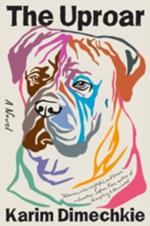Sharif is a good person. He knows that he is good because he’s aware of the privilege that he holds as a white man. He knows he is good because he chose to be a social worker at a nonprofit in Brooklyn, scraping by in New York City. And he knows he is good because his wife, Adjoua, a progressive Black novelist, has always said so. But Sharif’s goodness doesn’t protect him and Adjoua against bad luck. In an emergency, when they must find a new home for their beloved, unruly, giant dog before the imminent birth of their immunocompromised daughter, a desperate Sharif leaves Judy in the care of Emmanuel, a Haitian immigrant and Sharif’s social services client. When Emmanuel agrees to take the dog, it is only a momentary relief. What begins as a dispute between the young couple and Emmanuel’s teenage son soon draws both families into a maelstrom of unpredictable conflict.

The uproar
ISBN: 9780316581189
Format: Hardback
Publisher: Little Brown & Company
Origin: US
Release Date: June, 2025

